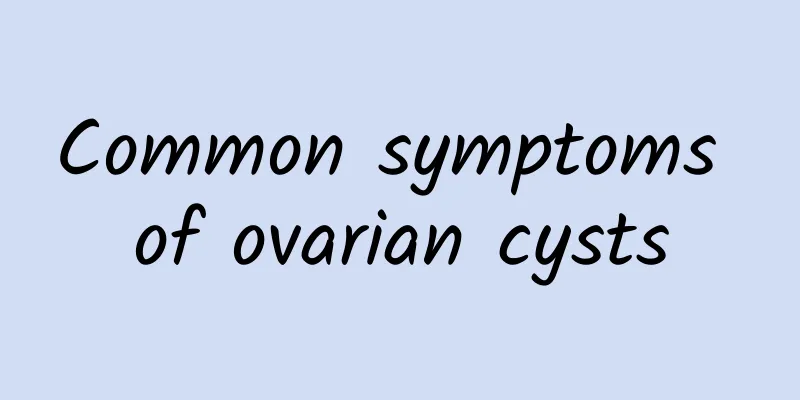Common symptoms of ovarian cysts

|
Ovarian cysts are a common gynecological disease in women with obvious symptoms, including abdominal enlargement, abdominal pain, menstrual disorders, etc. Although ovarian cysts are benign tumors, improper treatment may lead to malignant tumors. 1. Increased abdominal circumference and abdominal mass: This is the most common phenomenon in the main complaint. The patient notices that his clothes or belt seem too tight and then notices the enlargement of the abdomen, or occasionally feels uncomfortable in the morning and presses his abdomen to find a mass in the abdomen, plus abdominal distension and discomfort. 2. Discomfort in the lower abdomen: This is the initial symptom before the patient feels a lump in the lower abdomen. Due to the weight of the tumor itself, as well as the influence of intestinal peristalsis and changes in body position, the tumor moves in the pelvic cavity, pulling on its pedicle and the pelvic funnel ligament, causing the patient to feel distended and falling in the lower abdomen or iliac fossa. 3. Abdominal pain: If the tumor has no complications, there is little pain. Therefore, if patients with ovarian tumors feel abdominal pain, especially sudden onset, it is usually caused by tumor pedicle twisting, tumor rupture, bleeding or infection. In addition, malignant cysts often cause abdominal pain and leg pain, and the pain often causes patients to seek emergency treatment. 4. Menstrual changes: excessive menstrual flow, irregular menstrual cycles, prolonged menstrual duration, spotting, etc. 5. Abnormal leucorrhea: Tumors occur in the female reproductive tract, and the tumors become necrotic and ulcerated, causing watery, bloody, and rice-soup-like leucorrhea. If there is an infection, it may have a foul odor. 6. Lumps: They can grow in any part of the reproductive organs and may not cause any symptoms. 7. Changes in diet and urination and defecation: The initial symptoms may only be abdominal distension, poor appetite and gastrointestinal symptoms. Tumor compression or invasion of the bladder and rectum may cause frequent urination, difficulty urinating, dry stools, etc. 8. Postmenopausal bleeding: Vaginal bleeding may occur occasionally during the first year of menopause. |
<<: Will ovarian cysts cause ascites? In what cases will ascites occur?
>>: What are the symptoms of mild chronic cervicitis
Recommend
What medicine is effective for cervicitis
The treatment of cervicitis requires comprehensiv...
Can I eat fruit after a miscarriage?
Spontaneous abortion refers to non-artificial abo...
How to regulate irregular menstruation most effectively
Irregular menstruation refers to irregular menstr...
How bacterial vaginosis is transmitted
Bacterial vaginosis is a common gynecological inf...
Which hospital is better for treating endometrial thickening?
For many female friends, it is not difficult to t...
When is the best time for painless abortion?
Nowadays, painless abortion is the first choice f...
Overview of Ectopic Pregnancy
Ectopic pregnancy, also known as ectopic pregnanc...
Failure to lose weight may be due to lack of enzymes in the body! Japanese organic diet expert "Enzyme Slimming" lost 21kg
There is a way to lose weight that does not requi...
Women who get cold at night are more likely to develop pelvic inflammatory disease? Gynecological inflammation is prone to recurrence in autumn
Pelvic inflammatory disease is a common gynecolog...
Great for burning fat and promoting metabolism! Turmeric, cumin and other 6 spicy ingredients are the most popular
Guess what! What are the latest healthy eating tr...
What are the causes and classifications of amenorrhea?
Whether it is primary amenorrhea or secondary ame...
Learn about the examination items for ovarian cysts.
Did you know that ovarian cysts are classified in...
What are the causes of bacterial vaginosis?
Do you think there is only one type of vaginitis?...
End fat! Top 5 Weight Loss Exercises for 2015
After a year of trying to lose weight, have you s...
How to prevent cervical hypertrophy?
Among gynecological diseases, cervical hypertroph...









